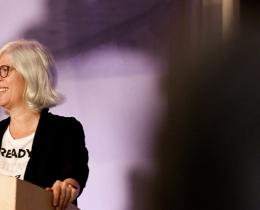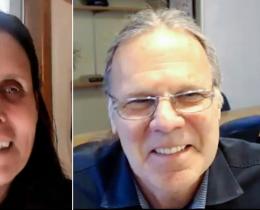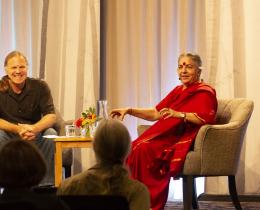People marvel at the way children live in the moment. Yet from the time we are very young we are taught to abandon our direct experience and move lock, stock, and barrel into the abstract land of the reasoning mind.
A reasoning mind is a great wonder! It helps us analyze, classify, learn, and plan; it is key to our survival. Yet, the older we get, the more lost in thought we become. We contemplate the past, we dream about the future, we worry, we anticipate, we fantasize about our lives. Our minds grow filled with an endless stream of chatter.
The Buddhists call this phenomenon the "monkey mind" because our mind jumps from thought to thought the way a monkey jumps from tree to tree. When you say, "Oops, my mind was somewhere else," that’s monkey mind.
As renowned spiritual teacher Eckhart Tolle said in his landmark book, The Power of Now, "The mind is a superb instrument if used rightly. Used wrongly, however, it becomes very destructive. To put it more accurately, it is not so much that you use your mind wrongly—you usually don't use it at all. It uses you. This is the disease…The instrument has taken you over."
The antidote to monkey mind is mindfulness, a technique in which a person becomes intentionally aware of his or her thoughts and actions in the present moment, non-judgmentally. Being mindful is having a big picture awareness that gives us a measure of objectivity about what we are thinking. It helps us step outside habituated responses and solve problems more creatively.
As a lawyer, trained to use my mind for analysis, it has taken me a long time to understand that we can cultivate an awareness that is beyond our mind; an awareness that uses all aspects of ourselves to "know" what is going on. It is a different, more whole and spacious kind of knowing than what we get from the mind alone.
When we are fully present in the moment and we quiet our dominating monkey mind (which takes practice and discipline), we make room to experience our lives through the rest of us—our heart, our body, and our mysterious spirit. Presence opens the way to directly experiencing our deep connection to the rest of the world.
The more we experience "unity" or "oneness," the less of an abstract idea it becomes. The goal is not to experience some fantasized version of unity that is naturally harmonious. Instead, it is to fully grasp how interconnected everything is, which helps us bring into focus that the consequences of all of our actions, big and small, impact others and the planet.
Through the practices of presence and mindfulness, we begin to see how the process of our own activism for seeking change matters. If we are using a peaceful process we are creating more peace. As we become more aware of the impact that our own actions have on others, we can become motivated to shift our activism approach away from the dominant adversarial ‘us versus them’ framework towards a unifying ‘we’re all in the same boat’ framework.
When we are opponents from the get-go, we can’t really listen to each other with a truly open ear. When we are collaborators on the same team or in the same family trying to solve a problem together we open up a world of new creative possibilities for solving problems and living nonviolently.
This is not easy, by any stretch. And it isn’t for every circumstance. But there are inroads that can be and are already being made with this approach to social change. A few years ago, I attended a unique gathering of women leaders from across the political spectrum convened by Reuniting America to have a "transpartisan" dialogue on a wide range of pressing issues. I didn’t know what to expect but was intrigued to be in a circle that included representatives of organizations I had long considered foes.
The best thing about the meeting was the freedom to drop assumptions and be fully present for the discussion. The ground-rules requiring "openness, acceptance, curiosity, discovery, sincerity, and brevity," created a safe space for us to listen to each other rather than position ourselves for a debate.
The goal for the meeting was not to create a new policy agenda (that would have taken more than a few days), but instead to help build a new foundation for civil discourse. We focused on the how of our communication, exploring whether improving the quality of our dialogue could improve our ability to work together as problem solvers. While we had serious differences of opinion, I was encouraged to find that we had substantial common ground.
The meeting validated my growing sense that our time calls for moving beyond seeing each other as enemies when we disagree. Spiritual activism invites us to cast off old adversarial habits and assumptions and meet each other in the healing and creative field of presence and mindfulness.
As Jon Kabat-Zinn, one of the great western teachers of mindfulness, says that being mindful, meaning living in the present is "the only time you ever have in which to learn anything or see anything or feel anything, or express any feeling or emotion, or respond to an event, or grow, or heal, is this moment, because this is the only moment any of us ever gets. You’re only here now; you’re only alive in this moment."
Many years have passed since I sat in that room with women representing a full spectrum of beliefs and opinions, some of which I have lifelong disagreements with. But in the process of breaking bread with them and listening with a more open ear than ever before, I feel called to do it again and again.
You can bring your mindful attention to the present moment either through a regular practice of prompting yourself to attention through cues, following your breath, listening to the sounds around you, focusing on each step you take…anything that is occurring in the present that you can pay attention to. As the witness to your own life, you can always ask yourself, "what’s happening right now? " and allow yourself to come out of your monkey mind and into the present moment.



